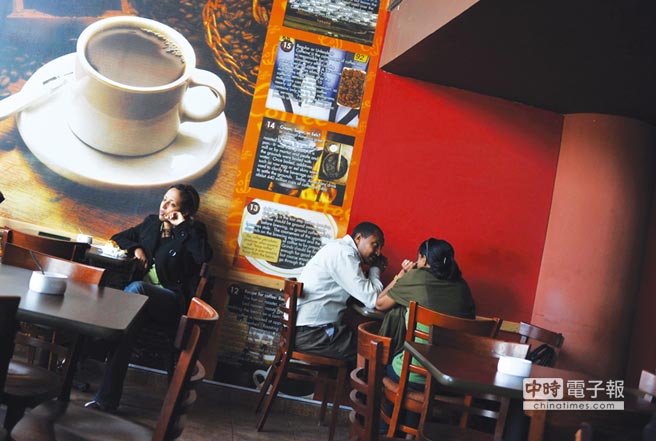The coffee craze in Africa in Kenya has soared by 46% in five years.

Coffee shop, coffee shop, ╱ in Africa.
Coffee consumption in Africa has greatly increased, such as Ken and Gandar have established their own coffee culture and become a new field of coffee, but they are also faced with new challenges of self-sufficiency.
■ While local and international coffee roasters are now looking at the growth potential, the question is whether the continent can grow enough coffee to satisfy its own consumers.
In Africa, coffee beans have been used as an economic crop for many years, but most of them are exported, and domestic demand is always very low. in Kenya and Taiwan, people often prefer to drink cheaper tea. However, demand for coffee in Africa grew by 20 per cent between 2009 and 2014, according to Euromonitor consumer research. David Barry, a commodity trader, said in response to the results that the growth of domestic coffee and the establishment of a coffee culture are beneficial to producing countries, and "farmers can know more about products." "
A strong domestic market can protect coffee producers from international shocks and demand fluctuations. In recent years, coffee has been affected by the output of Brazil, the world's largest producer. Arabica coffee beans, which are mainly produced in China, fell to US $2.29 per pound last year, but fell to US $1.16 in September this year.
There has been a 46% increase in consumer spending in five years.
Roberio Oliveira Silva, executive director of the International Coffee Organization (ICO), pointed out that in countries such as Calvary, Ivory Coast, Kenya and Gandar, coffee drinkers have increased in recent years due to the rise of middle-class coffee in cities. According to the Coffee Trade Organization of Kenya, the consumption of coffee in China surged by 46 per cent between 2010 and 2014.
There has also been a big increase in demand for coffee. Martin Maraka, the manager of the African Fine Coffee Organization, said, "now there is an increase in the number of people who can afford coffee, and as a result, sales have increased. "coupled with the fact that doctors dispel the myth that drinking coffee can have a negative impact on health," says Laura, "there were no coffee shops in Kampala, the capital, 10 years ago, but now there are 30 to 40, all of which serve high-end coffee. "
Even so, compared with Italy and Brazil, the consumption of coffee in African countries is still on the low side. According to ICO estimates, each person in Italy drinks an average of 5.8kg of coffee per year, while Brazilians drink 6.2kg per person per year, while the average per person in Africa is 2.5kg in Ethiopia, 1.28kg in Costa Rica and 0.8kg in Ivory Coast.
The power of coffee consumption in Africa has been matched by international coffee merchants, but the question is: can African coffee be self-sufficient?
Coffee beans grown in Africa are famous for their fruity and complex taste. From 1965 to 1988, eight African countries ranked among the top 20 coffee producers in the world, but now only four countries remain in the top 20. African coffee beans are one of the most refined varieties in the world, but the output of other coffee-producing countries has fallen sharply with the exception of Gandalda and Yisuobi.
Research data from ICO points out that the key lies in production efficiency. Ethiopia can produce 13 bags of 60-kilogram coffee beans per metric each year, compared with 12 bags of dry beans, compared with 50 to 60 bags in Brazil and nearly 40 bags in Vietnam.
The production capacity of the land is very high.
Another challenge for African producing countries is rapid urbanization and land appreciation. Due to the surge in domestic real estate demand and international coffee boom, many producers have lost their agricultural land. In Kiambu, a city north of Nairobi, the capital of Kenya, the Socfinaf Coffee Company of Belgium has allocated 13,500 hectares of farmland to construction companies, of which nearly 2000 hectares have been used for housing construction, with a capacity of 80,000 people.
Even in the face of the above difficulties, experts remain concerned about the output of African coffee. He believes that as long as farmers' professional knowledge of planting and processing is enhanced, the output can be increased tenfold. Barry points out that it has never been feasible to increase the annual production of two bags per square meter. (industrial and Commercial Times)
Important Notice :
前街咖啡 FrontStreet Coffee has moved to new addredd:
FrontStreet Coffee Address: 315,Donghua East Road,GuangZhou
Tel:020 38364473
- Prev

2015 fourth section "China Pu 'er Coffee Cup" World Siphon Pot Competition Suzhou kicked off
On October 30, 2015 Pu 'er Coffee and the 4th China Pu' er Coffee Cup World Siphon Pot Competition sponsored by Pu 'er Coffee Association opened in Suzhou, Jiangsu Province. Since its launch in 2013, the event has been successfully held for three times. With high specifications, strong professionalism and strict standards, the event has attracted the attention and participation of the coffee industry at home and abroad.
- Next

You may not know about coffee.
On a sunny afternoon, will you often have a strong cup of coffee on hand? You may have taken this as a habit that is hard to give up. But as one of the most popular drinks on the planet, your knowledge of coffee may not be as thorough as you might think. For example, how was coffee first discovered? How much water does it take to produce a pound of coffee beans? And whether Kopi Luwak is
Related
- What is the difference between Indonesian Sumatra Mantinin coffee and gold Mantinin? How to distinguish between real and fake golden Mantelin coffee?
- What does bypass mean in coffee? Why can hand-brewed coffee and water make it better?
- Unexpected! Ruixing Telunsu lattes use a smoothie machine to foam milk?!
- % Arabia's first store in Henan opens into the village?! Netizen: Thought it was P's
- Does an authentic standard mocha coffee recipe use chocolate sauce or powder? Mocha Latte/Dirty Coffee/Salty Mocha Coffee Recipe Share!
- What is the difference between Vietnam egg coffee and Norway egg coffee? Hand-brewed single product coffee filter paper filter cloth filter flat solution!
- What is the difference between sun-cured and honey-treated coffee? What are the differences in the flavor characteristics of sun-honey coffee?
- How to make Italian latte! How much milk does a standard latte use/what should the ratio of coffee to milk be?
- How to make butter American/butter latte/butter Dirty coffee? Is hand-brewed coffee good with butter?
- Is Dirty the cold version of Australian White? What is the difference between dirty coffee/decent coffee and Australian white espresso?

